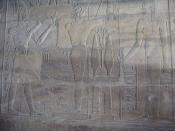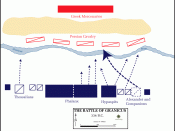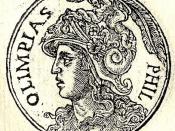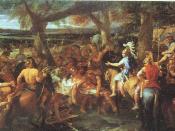The 1954 Film Alexander the Great was written, directed and produced by Robert Rosser a well renowned director for his time. Rosser employed a cast of first-rank British and American actors, and was backed by United Artist who put a lot of money in to the film. He was aiming for a masterpiece, but failed honorably . His depiction of Alexander's early life is relatively historically correct. The second half however, which deals with Alexander's crusades, was both chronologically and geographically erratic and incorrect, hurrying through the battles scenes and missing out important historical facts and even inventing its own. Yet we have to understand that Rosser used many unhistorical elements from Alexander fiction which existed throughout the middle age. Rosser certainly had limitations in telling his story, if he had a larger budget, the technology of today and less (at the time) conventional restriction in telling this story we may have been able to expect a better and more accurate portrayal of Alexander the Greats life .
The Film failure to place events in chronological is one of the most blatantly obvious faults in the film. Rosser manages to conflate important events into one encounter, which he did with the battles of Gaugamela and Issus. The worst example of this is the films depiction of Darius's Murder. While the film correctly describes the area where he was murdered, the story has been completely altered going so far as to place his death 5 years after his actual death. In the film while on a mission to find Alexander's army, Darius is captured by a gang of thieves. When Darius tries to flee he is stabbed several times with a sword and dies. Yet Arrian has a different interpretation of his murder, he claims that Darius was killed around 330-27 just before Alexander's North-eastern Campaign not 325 as the movie states. Arrain stated that the real murder of Darius was Bessus, who had arrested Darius and order that he be killed so that he could become King of Kings.
The first half of the film does manage to successfully capture Alexander's early childhood and the relationships he held during this time. Alexander was born to King Philip of Macedonia and his wife Olympias. Alexander had an often-strained relationship with his father, who was overpowering and manipulative. Their relationship came to a head when Phillip chooses to marry Cleopatra, threatening Alexander as heir to the throne. Alexander and Phillip had a terrible fight at Phillips wedding, where the drunken Phillip pulled out a knife on Alexander. This act of violence against his son resulted in Alexander and Olympias going into voluntary exile. The film illustrates correctly this fall out and the events that lead to it. Alexander's complex and loving relationship with his mother Olympias is also described correctly in the film. Although Olympias is portrayed in a bad light in some areas of the film, her relationship with Alexander is depicted as a loving and caring one. Alexander's own personal struggles as are young boy are portrayed beautifully in the film; full of emotional ambiguities and hidden resentment which are often reveled to the viewer through conversations with his companions Clietus, Ptolomy and Polotis . But the film fails to accurately show Alexander's father, Phillip, being murdered when Alexander was only 19.The films depiction of Phillips death has been obviously censored and rewritten to fit with the social and moral views of the 50's. The films version of the murder claims that Phillip was stabbed by Pausanias after a disagreement where Phillip laughed and pointedly ridiculed Pausanias. After brooding about this incident for some time, Pausanias struck at Phillip with a dagger killing him on the steps of the palace. However history tells a different story, Diodorus claims that the murder was a result of a homosexual love triangle, which placed Phillip at the center. Pausanias was one of Phillips bodyguards and because of his beauty became his lover. Seeing another young man, also called Pausanias, was attracting Phillips attentions, Pausanias called him a hermaphrodite who was ready to accept the favor of all and sundry. This other Pausanias unable to except this wanton abuse killed himself, after confiding in his friend Attulus. In an attempt to avenge his friends death Attulus, drugged Pausanias and handed him over unconscious to his grooms "ÃÂto ill-treat in their drunken sport. ' When Pausanias denounced Attulus to Phillip, he was furious, but because he was related to Attulus there was not much he could do. Attulus was left unpunished, and this was the injustice that tipped Pausanias over the edge. He was determined to punish not only Attulus, but the man who failed to punish him.
Historians have always debated whether or not Pausanias acted alone, and if so, who was his accomplice. There is evidence to link both Alexander and Olympias to the murder.Plutarch believed that Alexander encouraged Pausanias by quoting a verse from Medea, where Medea threatens to kill "ÃÂthe bride the groom and the father of the bride ' Yet the film refuses to malign Alexander's righteous and pious image, and instead points the finger at Olympias, making her the prime suspect. Instead of Alexander quoting Medea it is Olympias, who is also portrayed in the film as a bitter and jealous wife intent on revenge. The film also fails to show other events that which may have linked Alexander to his father's murder. History tells us how, after the death of Phillip the army who were attending the wedding were on hand to provide a quick election, naming Alexander king that very day. Some believed that this convenient election was more then just good timing for Alexander but a premeditated act to take the throne before suspicion could fall on him as Pausanias accomplice. Yet the film fails to show this, instead, having Alexander elected as king several days later, after careful discussions by the army.
The second half of the movie shows Alexander conquest in Persia. His journey begins at Hellespoint, Troy where Alexander approaches by boat, dressed in full Armour. As Alexander reaches land he jumps of his boat and throws his spear and calls out "ÃÂland one by the spear' although this scene seems to capture what both Ptolemy and Diodorus claim to have happened, Diodorus quotes Alexander differently, with him saying "ÃÂAsia; spear-won ' The Movies depictions of the battles that followed, were an inaccurate and lazy account of Alexander true conquests. Although only two battles are shown in depth, the battle of Granicus and the battle of Hydaspes, neither manages to show accurately the true scale of these battles nor Alexander's talent as a general and tactician .
The battle of Granicus, one of Alexander's first, is historically said to have taken place on a wide river bank of the Granicus river, at the time of the battle the river banks were muddy and slippery and the river was full due to the melted spring snow, the Macedonian army were said to be weary of fighting strait away due to the fact that the Persian held high ground on the opposite bank . However the Movie fails to show any of these important factors, in the movies portrayal they have the battle take place on a flat almost dry river bed, with both sides at an even position. The movie also fails to depict the actual size of both the army's, which according to Diodorus was around 37,100 and is confirmed by Arrain, yet the movie shows no more then 200 soldiers.
Alexander's skills as a tactician, one of his best leadership qualities was also over looked. The movie shows both sides running simultaneously at each other with no structure or order at all. However in actual fact the battle was structured in three phases, carefully planned and executed by Alexander.
The death of Memnon, during the battle of Granicus was also an unhistorical invention, during the battle scene we see Memnon a Greek who commanded an army of Greek mercenaries being killed by Alexander. In reality Memnon died of disease a year or so later, after leading the increasingly successful resistance against Alexander in western Asia Minor. To add a love affair, and a pretty face to the film Rosser exaggerates the relationship between Memnon's wife, Barsine and Alexander. In the film Alexander captures Barsine after Memnon's death. The two fall in love, and after that Barsine appears in most shots with Alexander. Barsine was certainly a captive of Alexander and most properly bore him a son, but this fact has been exaggerated far to much.
The Alexander's emotional attachments were homosexual to (Bagoas, Hephaestion, Cleitus.) Although Rosser's film Alexander the Great is not reliable as a historical epic, it does give us a semi reliable (if not one sided) insight into the character of Alexander the great and the relationships and interaction he had with others during his time. We must not look at Rosser's film as actual history but as a holywoodised film based on romantic fiction, censored and glamorized for a 50's society.




![Alexander Muir Public School, Toronto, 1902 [OHQ-PICTURES-S-R-599]](https://s.writework.com/uploads/9/95250/alexander-muir-public-school-toronto-1902-ohq-pictures-s-r-5-thumb.jpg)
